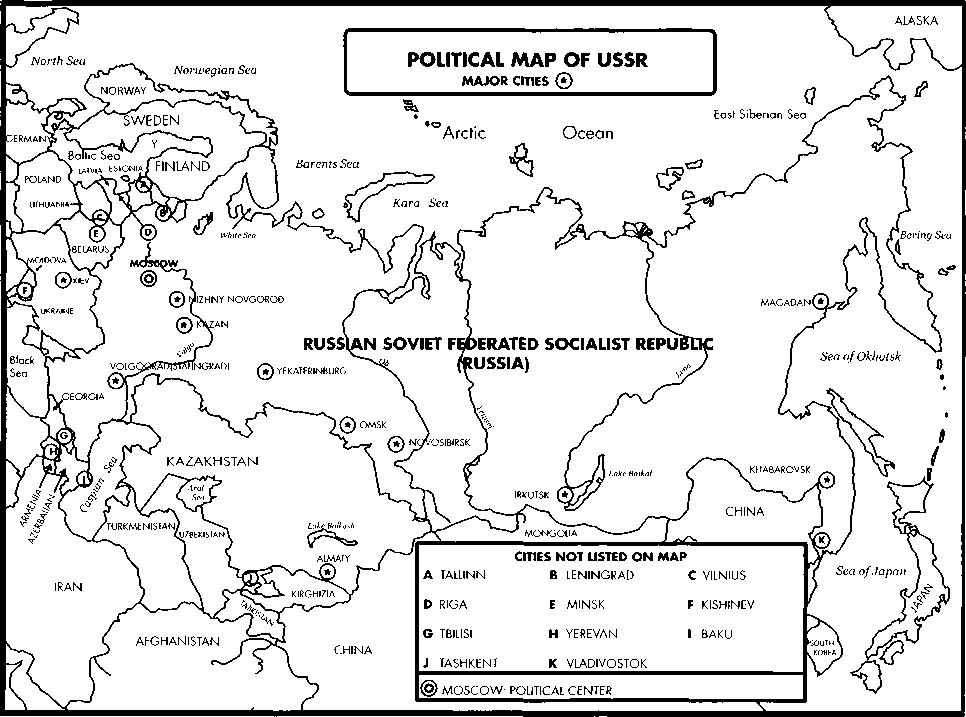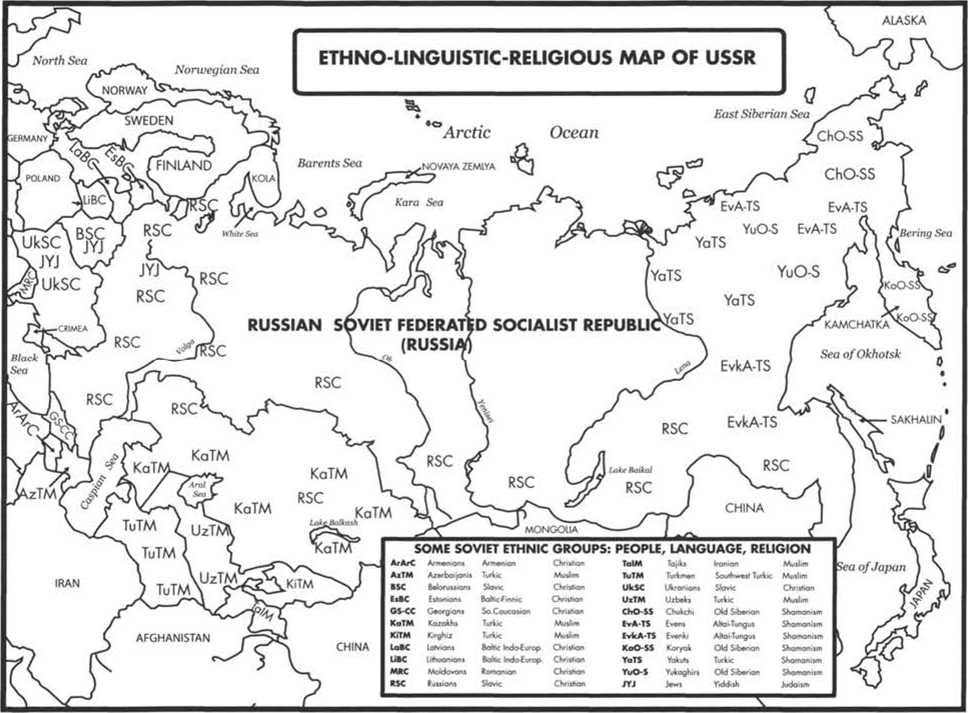In transliterating the sounds of Russian from the Cyrillic to the Roman alphabet, I have generally followed the systems (I and II) outlined by J. Thomas Shaw in The Transliteration of Modern Russian for English-Language Publications (Madison: University of Wisconsin Press, 1967). However, I made exceptions, especially where certain spellings that do not follow Shaw's system would look more familiar or be less confusing to readers.
This page intentionally left blank
Brief chronology of Russia and the soviet union in the Twentieth century
1898 Formation of the Marxist Russian Social Democratic Labor Party (RSDLP or SDs).
1901-02 Formation of Socialist Revolutionary Party (SRs); terrorist section of SRs devoted to assassination of government officials.
1903 RSDLP split: Bolsheviks under Vladimir I. Lenin, Mensheviks under Yuly Martov.
1905 Revolution: Bloody Sunday (Jan. 9 [old style]); massive strikes;
Nicholas II issues October Manifesto (Oct. 17 [old style]) establishing elected legislative assembly, the Duma.
1906-11 Prime Minister Pyotr Stolypin intensifies police actions against anti-tsarists and introduces a promising program of major agricultural reforms. In 1911 Stolypin is assassinated by a double (police/revolutionary) agent.
1914-18 World War I.
1917 February Revolution (March 8-16 [new style]); two popular assemblies form themselves by March 12-14 (new style): Provisional Government (which grew out of the Duma) and Petro-grad Soviet of Workers' and Soldiers' Deputies (soon composed mainly of SRs, Mensheviks, and Bolsheviks); Nicholas II abdicates (March 2 [old style]/15 [new style]); Bolsheviks overthrow Provisional Government and seize power (October 24-25 [old style] / November 6-7 [new style]).
1918 Constituent Assembly (elected in November 1917, SRs dominate) meets once on January 18-19 and is then dissolved by Bolsheviks; Nicholas II and family executed on July 17.
1918-20 Civil War between Reds (mainly Bolsheviks), who called their war policy "War Communism," and Whites (widely different political groups joined to fight Bolsheviks); United States, Britain, France, and Japan assist Whites.
1921 Kronstadt Revolt in March crushed by Bolsheviks; end of War Communism; great famine of 1921-22.
1921- 29 New Economic Policy (NEP), door partly opened to private
Enterprise.
1920s Stalin situates himself in top Party committees; elected General Secretary of Party in 1922.
1922 USSR (Union of Soviet Socialist Republics) founded on December 30.
1922- 24 Lenin impaired by three strokes (May 1922-March 1923); dies
January 21, 1924.
1924-29 Stalin outmaneuvers other leading Bolsheviks in struggle for political power.
1926 Family Code (October): eased divorce restraints but expanded rights to alimony, child support, and property obtained while married.
1928-32 First of the Five-Year Plans begins economic, especially industrial, revolution in USSR.
1929 National celebration of Stalin's 50th birthday on December 21 launches cult of personality; Stalin ends NEP and demands allout collectivization of agriculture and liquidation of kulaks (prosperous peasants).
1930 Collectivization begins in January.
1932-33 Great famine, especially in Ukraine.
1934 Leningrad Party leader Sergey Kirov assassinated (December 1); pretext for mass police terror.
1936- 38 Stalin destroys the party of Lenin: orders "trials," convictions,
And execution of leading Bolsheviks: first Moscow trial, August 1936; second trial, January 1937; third trial, March 1938.
1937- 38 Thousands of military officers, including top commanders,
Arrested and executed.
1939 Nazi Germany-USSR sign nonaggression pact and secretly agree to a partition of Eastern Europe; German invasion of Poland (from September 1) begins World War II; USSR invades eastern Poland (from September 17).
1939-40 USSR-Finland "Winter War."
1940 USSR annexes Baltic states (Estonia, Latvia, and Lithuania).
1941- 45 World War II, known to Russians as the Great Fatherland War.
German invasion of USSR begins on June 22,1941.
1942- 43 Soviet victory at Battle of Stalingrad (August-February) is one
Of war's turning points.
1943 Karachais and Kalmyks deported to the east in November-December.
1944 Chechens, Ingush, Balkars, Crimean Tatars, Ukrainians, and Byelorussians deported eastward.
1945 Soviet forces invade Germany in January, enter Berlin in April; Germany surrenders May 8.
1946-49 Soviet takeover of east-central Europe; police repression grows; cooling toward West; nuclear power and guided ballistic missiles developed; A-bomb tested (September 1949).
1953 Stalin's death (March 5) ends police action against alleged Jewish "doctors' plot"; top Party leaders jockey for power; Fl-bomb tested (August); Nikita Khrushchev elected Pirst Secretary of Central Committee (September).
1953-54 Rehabilitation of police terror victims and return of Gulag prisoners begins; signs of cultural thaw—Ilya Ehrenburg publishes novel The Thaw (1954)—but heavy-handed censorship and persecution of dissident writers continues.
1956 Twentieth Party Congress (Eebruary 14-25); Khrushchev delivers "secret" speech accusing Stalin of crimes; Flungarian revolt suppressed by Soviet troops (October-November).
1957 Sputnik launched (October 4).
1959 Underground press {samizdat, self-publishing) appears.
1961 Yuri Gagarin, aboard Vostok, becomes first man launched into space.
1962 Cuban missile crisis in October; Solzhenitsyn's One Day in the Life of Ivan Denisovich, depicting Gulag prison life, published in November with Khrushchev's blessing (but author deported from USSR in 1974 after publication of his longer expose. Gulag Archipelago, in Paris).
1964 Central Committee replaces Khrushchev (1894-1971) with Leonid Brezhnev (1906-82).
1968 Soviet troops invade Czechoslovakia; in Moscow, demonstrators against invasion are arrested and prosecuted.
1979 Soviet invasion of Afghanistan in December.
1982-85 Deaths of aged leaders quickly follow one another: Brezhnev, Andropov, Chernenko.
1985 Mikhail Gorbachev replaces Chernenko as First Secretary (March 11); advocates glasnost' (openness), perestroika (reconstruction), and democratic political reform.
1986 Disorders in Georgia (Soviet troops kill demonstrators); Chernobyl disaster (April 26) not reported for several days despite Gorbachev's promise of glasnost.
1989 USSR Congress of People's Deputies elected, some in democratic elections; Gorbachev announces USSR will leave Afghanistan; workers' strikes; Lithuanian national movement grows.
1990 Russian Federation begins to pull away from USSR as Boris Yeltsin and others move to establish their own parties; Gorbachev elected USSR president.
1991 Yeltsin elected president of the Russian Federation in June; in August Yeltsin foils attempt of hard right to overthrow Gorbachev; Yeltsin's actions put him in the spotlight of favorable public attention.
1991 Independence movements grow; Soviet forces kill 14 in Vilnius (Lithuania); six republics declare independence in October; recognition that the rest of the 15 republics are independent and the USSR dissolved comes with the formation of the Commonwealth of Independent States (CIS) on December 21; Gorbachev resigns on December 25; USSR formally dissolved on December 31.






 World History
World History









